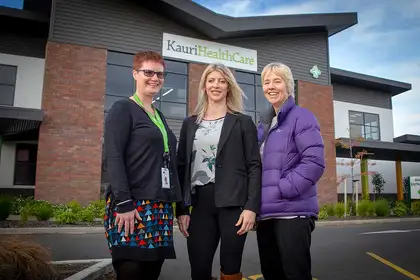
(from left) Dr Anna Skinner (clinical director at Kauri Healthcare) with Massey clinical psychologists Sarah Malthus and Maria Berrett.
A pilot scheme to base psychologists in a general practitioner (GP) clinic may help prevent more serious mental health crises through early intervention.
The project is being led by Massey University psychologists in partnership with Kauri Integrated Family Health Centre (IFHC) in Palmerston North, the Central Primary Health Organisation (CPHO) and the MidCentral District Health Board.
It has been designed so that patients can seek immediate free help for mild to moderate mental health issues.
Sarah Malthus, a clinical psychologist from Massey’s Psychology Clinic at the Manawatū campus who leads the scheme, says the aim is to provide support to patients seeking help through a GP before their issue escalates to a more serious level.
“If a patient raises concerns about stress, anxiety, depression or health issues that have a psychological aspect, their doctor or another health professional in the centre can suggest they see the in-house psychologist straight away, with follow-up sessions available as required,” she says.
Recognising link between physical and mental health
The pilot scheme, involving two Massey psychologists sharing a full-time position at the centre, reflects a shift in understandings among medical health professionals about how physical and mental health are interwoven and inseparable, and that treatment options need to address this.
Psychologists offer a ‘talking therapy’, known as FACT (Focussed Acceptance and Commitment Therapy), to engage the patient, clarify the issue and help develop strategies and tools for coping.
“Given the limited availability of other supports, GPs are often left with medication such as antidepressants and anxiolytics [anti-anxiety medication] as the only option,” Ms Malthus says. “They simply don’t have the time or resources to deal with many of the underlying issues that their patient presents with.”
Referring people for private counselling or therapy is not always appropriate because of cost and waiting times for public mental health services can be lengthy.
She says research shows that brief FACT-based psychological interventions based on increasing emotional awareness and acceptance and setting behaviour change goals based on clients’ personal values are highly effective, with patients able to make significant progress in a short space of time.
“Clients with long-standing problems are just as likely to experience rapid change as those with time limited problems,” she says.
Psychologists at GP clinic helps to de-stigmatise mental health issues
The scheme, says Ms Malthus, represents a more enlightened approach to health care which views wellness as encompassing both physical and mental dimensions.
Access to a psychologist within a general health setting also helps to de-stigmatise fear and increase understanding about mental health support in the wider community, especially for first-time users of such services, she says.
Ms Malthus and her team have also been providing training for GPs and other health professionals at Kauri Healthcare so that they can readily identify when a patient might benefit from talking to a psychologist.
Dr Anna Skinner, clinical director for Kauri Healthcare, says; “It has been amazing to have expert and effective psychological interventions available on the same day to patients with mental health needs and also those with long-term conditions who really benefit from support to acknowledge, accept and manage their complex health conditions.
“From diabetes to anxiety, multiple sclerosis to stress and overwhelm, FACT is a rapidly effective tool thatenables our patients to move forward towards their health and wellbeing goals.”
The scheme will be evaluated, and the team believes it has the potential to become a model used by primary health care providers around the country.
Maria Berrett, acting director at the Massey clinic, says the pilot is “a very innovative project, which makes psychological support accessible to many who wouldn’t otherwise be able to access it.
“The immediacy of the support means that people are able to get coping strategies and support at an early stage and at the time it’s needed rather than potentially allowing unaddressed issues to wait and to escalate. We are actioning the well-recognised biopsychosocial model in practice, which emphasises the interaction between physical, social and psychological aspects of health. Our project allows patients to benefit from the central role that psychological intervention has to contribute to holistic wellbeing.”